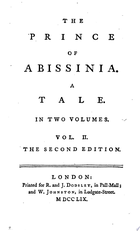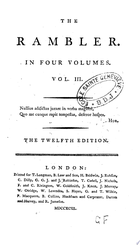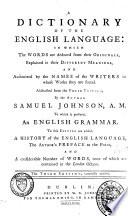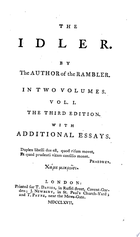Works

The History of Rasselas, Prince of Abissinia
Samuel Johnson
The Rambler
Samuel Johnson
A Dictionary of the English Language
Samuel Johnson
The Idler
Samuel Johnson
A Journey to the Western Islands of Scotland
Samuel JohnsonLondon
Samuel JohnsonFamous Samuel Johnson Quotes
“Curiosity is, in great and generous minds, the first passion and the last.”
Source: Works of Samuel Johnson
1755, p. 83
Life of Samuel Johnson (1791), Vol I
Samuel Johnson Quotes about life
“The only end of writing is to enable the readers better to enjoy life, or better to endure it.”
A Review http://andromeda.rutgers.edu/~jlynch/Texts/jenyns.html of Soame Jenyns' A Free Enquiry into the Nature and Origin of Evil, published in the first volume of Miscellaneous and Fugitive Pieces (London, 1774), p. 23
September 20, 1777, p. 356
Life of Samuel Johnson (1791), Vol III
Source: The Life of Samuel Johnson LL.D. Vol 3
February 7, 1754 (Letter to Lord Chesterfield)
Life of Samuel Johnson (1791), Vol I
Prologue at the Opening of Drury Lane Theatre (1747)
Samuel Johnson: Trending quotes
Attributed in Instructions to Young Sportsmen (1824) by Colonel Peter Hawker
Samuel Johnson Quotes
“Every man is rich or poor according to the proportion between his desires and his enjoyments”
No. 163 (8 October 1751)
The Rambler (1750–1752)
Context: Every man is rich or poor according to the proportion between his desires and his enjoyments; any enlargement of wishes is therefore equally destructive to happiness with the diminution of possession, and he that teaches another to long for what he never shall obtain is no less an enemy to his quiet than if he had robbed him of part of his patrimony.
“It is better to live rich, than to die rich.”
April 17, 1778
Life of Samuel Johnson (1791), Vol III
“Claret is the liquor for boys; port for men; but he who aspires to be a hero must drink brandy.”
April 7, 1779
Life of Samuel Johnson (1791), Vol III
“Hope is itself a species of happiness, and, perhaps, the chief happiness which this world affords”
Letter, June 8, 1762 [to an unnamed recipient], p. 103
Life of Samuel Johnson (1791), Vol I
Context: Hope is itself a species of happiness, and, perhaps, the chief happiness which this world affords: but, like all other pleasures immoderately enjoyed, the excesses of hope must be expiated by pain; and expectations improperly indulged must end in disappointment. If it be asked, what is the improper expectation which it is dangerous to indulge, experience will quickly answer, that it is such expectation as is dictated not by reason, but by desire; expectation raised, not by the common occurrences of life, but by the wants of the expectant; an expectation that requires the common course of things to be changed, and the general rules of action to be broken.
No. 96 (16 February 1751)
Source: The Rambler (1750–1752)
1770, p. 182
Life of Samuel Johnson (1791), Vol II
“He is no wise man that will quit a certainty for an uncertainty.”
No. 57 (May 19, 1759)
Bartlett's Familiar Quotations, 10th ed. (1919)
Source: The History of Rasselas, Prince of Abissinia (1759), Chapter 31
Context: “That the dead are seen no more,” said Imlac, “I will not undertake to maintain against the concurrent and unvaried testimony of all ages and of all nations. There is no people, rude or learned, among whom apparitions of the dead are not related and believed. This opinion, which perhaps prevails as far as human nature is diffused, could become universal only by its truth: those that never heard of one another would not have agreed in a tale which nothing but experience can make credible. That it is doubted by single cavillers can very little weaken the general evidence, and some who deny it with their tongues confess it by their fears.
“Yet I do not mean to add new terrors to those which have already seized upon Pekuah. There can be no reason why spectres should haunt the Pyramid more than other places, or why they should have power or will to hurt innocence and purity. Our entrance is no violation of their privileges: we can take nothing from them; how, then, can we offend them?”
The Patriot (1774)
Context: Some claim a place in the list of patriots, by an acrimonious and unremitting opposition to the court. This mark is by no means infallible. Patriotism is not necessarily included in rebellion. A man may hate his king, yet not love his country.
“Strange! that this general fraud from day to day
Should fill the world with wretches undetected.”
The Tragedy of Irene (1749), Act III, Sc. 2
Context: To-morrow's action! Can that hoary wisdom,
Borne down with years, still doat upon tomorrow!
That fatal mistress of the young, the lazy,
The coward, and the fool, condemn'd to lose
A useless life in waiting for to-morrow,
To gaze with longing eyes upon to-morrow,
Till interposing death destroys the prospect
Strange! that this general fraud from day to day
Should fill the world with wretches undetected.
The soldier, labouring through a winter's march,
Still sees to-morrow drest in robes of triumph;
Still to the lover's long-expecting arms
To-morrow brings the visionary bride.
But thou, too old to hear another cheat,
Learn, that the present hour alone is man's.
“It is seldom that we find either men or places such as we expect them.”
No. 58 (May 26, 1759)
The Idler (1758–1760)
Context: It is seldom that we find either men or places such as we expect them.... Yet it is necessary to hope, though hope should always be deluded, for hope itself is happiness, and its frustrations, however frequent, are yet less dreadful than its extinction.
“Ye Fops, be silent: and ye Wits, be just.”
The Tragedy of Irene (1749), Prologue
Context: Unmoved though Witlings sneer and Rivals rail,
Studious to please, yet not ashamed to fail.
He scorns the meek address, the suppliant strain.
With merit needless, and without it vain.
In Reason, Nature, Truth, he dares to trust:
Ye Fops, be silent: and ye Wits, be just.
July 21, 1763, p 514 http://books.google.com/books?id=JOseAAAAMAAJ&q="Truth+Sir+is+a+cow+which+will+yield+such+people+no+more+milk+and+so+they+are+gone+to+milk+the+bull1"&pg=PA514#v=onepage
Life of Samuel Johnson (1791), Vol I
Context: Hume, and other sceptical innovators, are vain men, and will gratify themselves at any expence. Truth will not afford sufficient food to their vanity; so they have betaken themselves to errour. Truth, Sir, is a cow which will yield such people no more milk, and so they are gone to milk the bull. If I could have allowed myself to gratify my vanity at the expence of truth, what fame might I have acquired.
The Patriot (1774)
Context: A man sometimes starts up a patriot, only by disseminating discontent, and propagating reports of secret influence, of dangerous counsels, of violated rights, and encroaching usurpation. This practice is no certain note of patriotism. To instigate the populace with rage beyond the provocation, is to suspend publick happiness, if not to destroy it. He is no lover of his country, that unnecessarily disturbs its peace. Few errours and few faults of government, can justify an appeal to the rabble; who ought not to judge of what they cannot understand, and whose opinions are not propagated by reason, but caught by contagion. The fallaciousness of this note of patriotism is particularly apparent, when the clamour continues after the evil is past.
October 26, 1769, p. 174
Life of Samuel Johnson (1791), Vol II
“Promise, large promise, is the soul of an advertisement.”
No. 40 (January 20, 1759)
The Idler (1758–1760)
Context: Advertisements are now so numerous that they are very negligently perused, and it is, therefore, become necessary to gain attention by magnificence of promises, and by eloquence sometimes sublime and sometimes pathetick. Promise, large promise, is the soul of an advertisement.
September 23, 1777, p. 363
Life of Samuel Johnson (1791), Vol III
Context: It must be agreed that in most ages many countries have had part of their inhabitants in a state of slavery; yet it may be doubted whether slavery can ever be supposed the natural condition of man. It is impossible not to conceive that men in their original state were equal; and very difficult to imagine how one would be subjected to another but by violent compulsion. An individual may, indeed, forfeit his liberty by a crime; but he cannot by that crime forfeit the liberty of his children.
“Hope is necessary in every condition.”
No. 67 (6 November 1750)
The Rambler (1750–1752)
Context: Hope is necessary in every condition. The miseries of poverty, of sickness, or captivity, would, without this comfort, be insupportable; nor does it appear that the happiest lot of terrestrial existence can set us above the want of this general blessing; or that life, when the gifts of nature and of fortune are accumulated upon it, would not still be wretched, were it not elevated and delighted by the expectation of some new possession, of some enjoyment yet behind, by which the wish shall at last be satisfied, and the heart filled up to its utmost extent.
“I fancy mankind may come, in time, to write all aphoristically, except in narrative”
August 16, 1773
The Journal of a Tour to the Hebrides (1785)
Context: I fancy mankind may come, in time, to write all aphoristically, except in narrative; grow weary of preparation, and connection, and illustration, and all those arts by which a big book is made.
“Unmoved though Witlings sneer and Rivals rail,
Studious to please, yet not ashamed to fail.”
The Tragedy of Irene (1749), Prologue
Context: Unmoved though Witlings sneer and Rivals rail,
Studious to please, yet not ashamed to fail.
He scorns the meek address, the suppliant strain.
With merit needless, and without it vain.
In Reason, Nature, Truth, he dares to trust:
Ye Fops, be silent: and ye Wits, be just.
“That book is good in vain, which the reader throws away.”
The Life of Dryden
Lives of the English Poets (1779–81)
Context: It is not by comparing line with line, that the merit of great works is to be estimated, but by their general effects and ultimate result. It is easy to note a weak line, and write one more vigorous in its place; to find a happiness of expression in the original, and transplant it by force into the version: but what is given to the parts may be subducted from the whole, and the reader may be weary, though the critick may commend. Works of imagination excel by their allurement and delight; by their power of attracting and detaining the attention. That book is good in vain, which the reader throws away. He only is the master, who keeps the mind in pleasing captivity; whose pages are perused with eagerness, and in hope of new pleasure are perused again; and whose conclusion is perceived with an eye of sorrow, such as the traveller casts upon departing day.
The Patriot (1774)
Context: It ought to be deeply impressed on the minds of all who have voices in this national deliberation, that no man can deserve a seat in parliament, who is not a patriot. No other man will protect our rights: no other man can merit our confidence.
A patriot is he whose publick conduct is regulated by one single motive, the love of his country; who, as an agent in parliament, has, for himself, neither hope nor fear, neither kindness nor resentment, but refers every thing to the common interest.
Source: The History of Rasselas, Prince of Abissinia (1759), Chapter 31
Context: “That the dead are seen no more,” said Imlac, “I will not undertake to maintain against the concurrent and unvaried testimony of all ages and of all nations. There is no people, rude or learned, among whom apparitions of the dead are not related and believed. This opinion, which perhaps prevails as far as human nature is diffused, could become universal only by its truth: those that never heard of one another would not have agreed in a tale which nothing but experience can make credible. That it is doubted by single cavillers can very little weaken the general evidence, and some who deny it with their tongues confess it by their fears.
“Yet I do not mean to add new terrors to those which have already seized upon Pekuah. There can be no reason why spectres should haunt the Pyramid more than other places, or why they should have power or will to hurt innocence and purity. Our entrance is no violation of their privileges: we can take nothing from them; how, then, can we offend them?”
Preface http://andromeda.rutgers.edu/~jlynch/Texts/preface.html
A Dictionary of the English Language (1755)
Context: It is the fate of those, who toil at the lower employments of life, to be rather driven by the fear of evil, than attracted by the prospect of good; to be exposed to censure, without hope of praise; to be disgraced by miscarriage, or punished for neglect, where success would have been without applause, and diligence without reward. Among these unhappy mortals is the writer of dictionaries, whom mankind have considered, not as the pupil, but the slave of science, the pioneer of literature, doomed only to remove rubbish and clear obstructions from the paths through which Learning and Genius press forward to conquest and glory, without bestowing a smile on the humble drudge that facilitates their progress. Every other author may aspire to praise; the lexicographer can only hope to escape reproach, and even this negative recompense has been yet granted to very few.
No. 43 (14 August 1750) http://etext.lib.virginia.edu/etcbin/toccer-new2?id=Joh1Ram.sgm&images=images/modeng&data=/texts/english/modeng/parsed&tag=public&part=43&division=div1
The Rambler (1750–1752)
Context: All the performances of human art, at which we look with praise or wonder, are instances of the resistless force of perseverance: it is by this that the quarry becomes a pyramid, and that distant countries are united with canals. If a man was to compare the effect of a single stroke of the pick-axe, or of one impression of the spade, with the general design and last result, he would be overwhelmed by the sense of their disproportion; yet those petty operations, incessantly continued, in time surmount the greatest difficulties, and mountains are levelled, and oceans bounded, by the slender force of human beings.
It is therefore of the utmost importance that those, who have any intention of deviating from the beaten roads of life, and acquiring a reputation superior to names hourly swept away by time among the refuse of fame, should add to their reason, and their spirit, the power of persisting in their purposes; acquire the art of sapping what they cannot batter, and the habit of vanquishing obstinate resistance by obstinate attacks.
Letter to James Macpherson, 20 June 1778. (Quotation used as epigram to Władysław Tatarkiewicz, "Dwa pojęcia poezji" ("Two Concepts of Poetry"), in Tatarkiewicz's book, Parerga, Warsaw, Państwowe Wydawnictwo Naukowe, 1978, pp. 20–38.)
Letters to and from Dr. Samuel Johnson
“Learn, that the present hour alone is man's.”
The Tragedy of Irene (1749), Act III, Sc. 2
Context: To-morrow's action! Can that hoary wisdom,
Borne down with years, still doat upon tomorrow!
That fatal mistress of the young, the lazy,
The coward, and the fool, condemn'd to lose
A useless life in waiting for to-morrow,
To gaze with longing eyes upon to-morrow,
Till interposing death destroys the prospect
Strange! that this general fraud from day to day
Should fill the world with wretches undetected.
The soldier, labouring through a winter's march,
Still sees to-morrow drest in robes of triumph;
Still to the lover's long-expecting arms
To-morrow brings the visionary bride.
But thou, too old to hear another cheat,
Learn, that the present hour alone is man's.
“I hate mankind, for I think myself one of the best of them, and I know how bad I am.”
Actually said by Giuseppe Baretti, February 13, 1766. The Samuel Johnson Sound Bite Page http://www.samueljohnson.com/apocryph.html#19, retrieved 24 October 2018
Misattributed
Source: A Journey to the Western Islands of Scotland and The Journal of a Tour to the Hebrides
“He who makes a beast of himself gets rid of the pain of being a man.”
Quoted in "Anecdotes of the Revd. Percival Stockdale" (1809) in Johnsonian Miscellanies (1897), vol. II, p. 333, edited by George Birkbeck Hill; also quoted in Fear and Loathing in Las Vegas by Hunter S. Thompson, in the Avenged Sevenfold song "Bat Country", and in Kingdom S02E04.
“A writer only begins a book. A reader finishes it.”
Source: Works of Samuel Johnson
“What is written without effort is in general read without pleasure.”
First attributed to Johnson 15 years posthumously in a footnote in William Seward's Biographiana (1799), but written in slightly different form in 1764, in a profile in The Scots Magazine of Charles Churchill. The Scots Magazine, Volume 26 https://books.google.co.uk/books?id=y14AAAAAYAAJ&q=%22without+effort%22&redir_esc=y&hl=en#v=snippet&q=%22without%20effort%22&f=false
Quote Investigator http://quoteinvestigator.com/2014/11/08/without-effort/, retrieved 17 May 2016
Misattributed
Source: Johnsonian Miscellanies - Vol II
“Curiosity is one of the permanent and certain characteristics of a vigorous intellect.”
No. 103 (12 March 1751)
Variant: Curiosity is one of the permanent and certain characteristics of a vigorous mind.
Source: The Rambler (1750–1752)
"Many people believe Samuel Johnson said it, but no one seems to have found it anywhere in his works or letters, or, for that matter any of the biographies of him by his contemporaries. I'm basing that on what's been included in Primary Source Media's CD-ROM of Johnson and Boswell. The CD-ROM includes all of Johnson's writings in the canon, Boswell's Life of Johnson and Tour of the Hebrides, as well as accounts from Hester Thrale, Sir John Hawkins, Fanny Burney, plus O.M. Brack's 'Early Biographies.' In short, practically nothing from the 18th Century has been left out. In addition, I've also consulted 'The Beauties of Johnson,' an 18th Century collection of Johnson quotations."
“Your manuscript is both good and original. …” http://www.samueljohnson.com/goodorig.html at The Samuel Johnson Sound Bite Page http://www.samueljohnson.com/ Retrieved 2013-07-07
Misattributed
“Patriotism is the last refuge of a scoundrel.”
April 7, 1775, p. 253
Boswell's full mention of this statement reads:
:Patriotism having become one of our topicks, Johnson suddenly uttered, in a strong determined tone, an apophthegm, at which many will start: "Patriotism is the last refuge of a scoundrel." But let it be considered, that he did not mean a real and generous love of our country, but that pretended patriotism which so many, in all ages and countries, have made a cloak of self-interest.
Life of Samuel Johnson (1791), Vol II
“I never desire to converse with a man who has written more than he has read.”
Quoted in the "Apophthegms, Sentiments, Opinions and Occasional Reflections" of Sir John Hawkins (1787-1789) in Johnsonian Miscellanies (1897), vol. II, p. 6, edited by George Birkbeck Hill
Source: Johnsonian Miscellanies - Vol II
“Few things are impossible to diligence and skill.”
Source: The History of Rasselas, Prince of Abissinia (1759), Chapter 12
March 26, 1779
Life of Samuel Johnson (1791), Vol III
Source: The History of Rasselas, Prince of Abissinia (1759), Chapter 41
“Almost all absurdity of conduct arises from the imitation of those whom we cannot resemble.”
No. 135 (2 July 1751)
Source: The Rambler (1750–1752)
“Hell is paved with good intentions.”
April 14, 1775
Malone added a footnote indicating this is a "proverbial sentence", quoting an earlier 1651 source. At least two other sources appear prior to Johnson. John Ray, in 1670, cited as a proverb, "Hell is paved with good intentions." Even earlier than that, it has been attributed to Saint Bernard of Clairvaux (1091-1153), as "Hell is full of good intentions or desires."
[alt.quotations, Earlier Attributions, Wilson, Robert, UseNet, 2009-01-06]
Note that "The road to Hell…" is not part of the quotation.
The Samuel Johnson web site suggests this entry is dated 16 April, but it appears to be part of the previous entry.
Samuel Johnson web site http://www.samueljohnson.com/road.html
Life of Samuel Johnson (1791), Vol II
Source: The Life of Samuel Johnson LL.D. Vol 2
April 6, 1775
Life of Samuel Johnson (1791), Vol II
Source: The Life of Samuel Johnson LL.D. Vol 2
“What we hope ever to do with ease, we must first learn to do with diligence.”
Source: The Life Of Samuel Johnson, Vol. 4
April 18, 1775, p. 258
Life of Samuel Johnson (1791), Vol II
